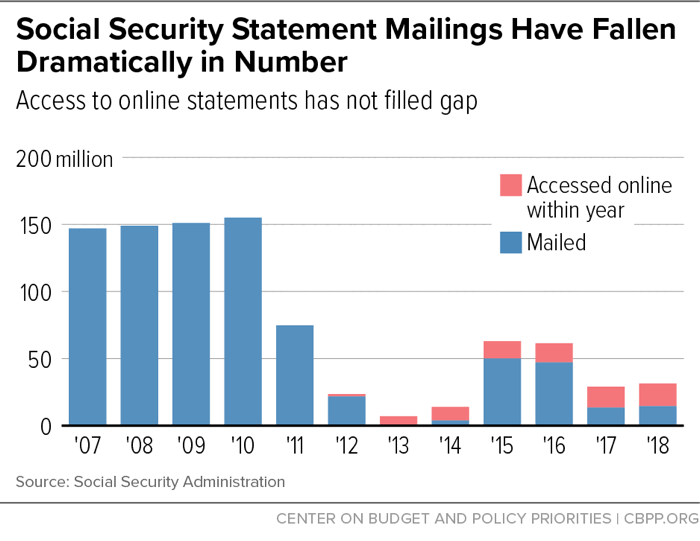BEYOND THE NUMBERS
A bipartisan bill from Reps. John Larson and Vern Buchanan and Senators Ron Wyden and Bill Cassidy would clarify that the Social Security Administration (SSA) must mail statements to almost all workers. Though the law already requires that, SSA has dramatically cut the number that it’s sent to workers amid budget cuts, arguing that they can access statements online. But most workers aren’t accessing them, the data show, meaning they’re missing out on the statements’ personalized earnings histories, benefit estimates, and information about Social Security, all of which can help them plan their financial futures.
Until about a decade ago, SSA sent statements yearly to workers 25 and older. Now, only those 60 or over who haven’t claimed benefits or created an online account get a mailed statement. Instead, SSA encourages workers to access their statements online — and, if they do, the agency automatically opts them out of ever receiving a paper statement. But online statements haven’t come close to offsetting the dramatic decline in the number mailed, as the figure below shows. More than three-quarters of workers haven’t registered for an account — and less than half of those with an online account logged in to check their statements last year.
Under the bill, SSA must resume mailing annual paper statements to every worker over age 25, with very limited exceptions. Here are five reasons why SSA should resume mailing Social Security statements to most workers:
- Workers want SSA to mail them information about their benefits. SSA mailings top the list of how workers and retirees would like to learn about their benefits: 84 percent of non-retirees and 91 percent of retirees say mailings would help. Most voters want to get their statements by mail, not online, polling finds.
- Statements build public knowledge of and trust in Social Security. The vast majority of workers who get mailed statements read them, boosting their benefit knowledge and confidence in Social Security, according to several studies.
- The statement can help retirement planning. Millions of Americans who receive statements say they’re “much more likely to take action to increase their own financial security.” And those who received statements were likelier to work after their receipt.
- Statements can increase disabled workers’ access to benefits they’ve earned. When mailed statements, those previously reporting a work limitation became likelier to apply for Social Security Disability Insurance benefits. Crucially, SSA was as likely to approve their benefits as to approve the benefits of other applicants, indicating that many workers entitled to these benefits don’t receive them simply because they lack the sort of information that the statement provides.
- The statement lets workers correct their earnings records and detect identity theft. SSA-commissioned surveys found that statements help workers verify their earnings, which are much harder to check and correct years after the fact. Discrepancies in earnings records can indicate identity theft.

